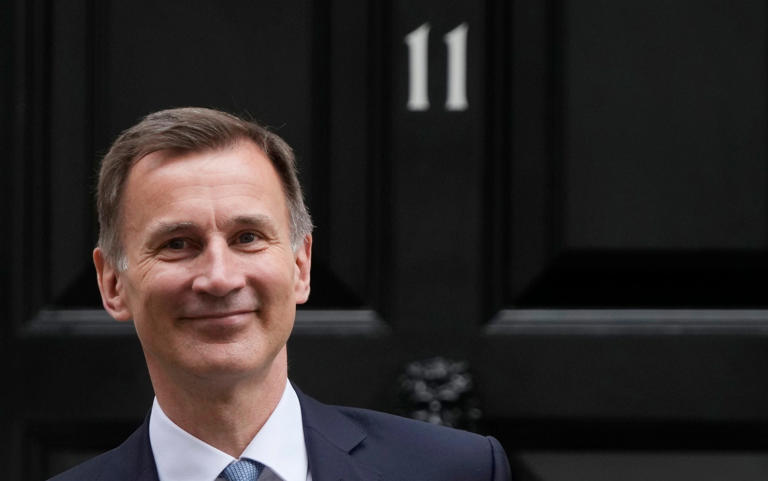Jeremy Hunt is reportedly considering abolishing non-domiciled (non-dom) status as a means to finance tax cuts for millions of workers in the upcoming Budget. This proposal is part of a list of potential revenue-raising options presented to Chancellor Rishi Sunak due to economic forecasts leaving less room for tax reductions or increased spending.
If implemented, this move by the Conservatives would adopt a policy traditionally associated with the Labour Party, potentially sparking debate over its economic impact. Critics argue that scrapping non-dom status could deter wealthy foreigners from residing in the UK, potentially impacting the competitiveness of the City of London.
Hunt has instructed officials to ensure that any Budget measures do not compromise the City’s competitiveness. This consideration arises amidst a broader debate over defense spending, with Penny Mordaunt emphasizing the importance of adequately funding Britain’s defense capabilities.
Additionally, the Treasury is contemplating a reduction in future spending on public services following the general election, potentially revising the assumption of annual real terms spending increases downwards from 1% to 0.75%.
These developments underscore the complex economic and political considerations facing policymakers as they navigate budgetary decisions amidst shifting economic landscapes and competing priorities.
The potential inclusion of the pensions triple lock in the Conservative Party’s next election manifesto provides a boost for pensioners. This policy ensures that state pensions increase annually by the highest of inflation, average earnings growth, or 2.5%.
Non-domiciled status, on the other hand, enables foreign nationals living in the UK, but officially domiciled overseas, to avoid paying UK tax on their foreign income or capital gains. Scrapping this status could have significant implications for tax revenue, although the exact amount remains uncertain. Some estimates suggest it could generate £3.6 billion annually, while Labour’s proposed alternative, which tightens tax relief for temporary residents, is projected to yield £2 billion per year.
The decision on whether to include this measure in the Budget hinges on the forthcoming economic and fiscal forecasts from the Office for Budget Responsibility. These forecasts, expected later this week, will inform the government’s assessment of the fiscal landscape and the necessity of revenue-raising measures like abolishing non-dom status.
The consideration of scrapping the non-dom tax status indicates the seriousness with which the Treasury and No 10 are evaluating potential revenue-raising options. With less than a week until the Budget, Chancellor Jeremy Hunt is keen to announce tax cuts, but fiscal constraints due to smaller-than-expected estimates for fiscal headroom have limited the government’s options.
While Mr. Hunt had previously spoken against abolishing the non-dom tax status in November 2022, citing concerns about driving wealthy foreigners away from the UK, the political landscape has since shifted. Labour’s proposal to abolish the status and redirect the savings towards various spending initiatives, including healthcare and education, has added a new dimension to the debate.
The potential political benefits for Mr. Hunt include undermining Labour’s spending plans and forcing them to explain alternative sources of funding if they wish to retain the tax cuts. However, there are complexities to consider, including potential scrutiny of Chancellor Rishi Sunak’s wife’s tax status, which became a subject of controversy in spring 2022.
Despite the political nuances and complexities involved, the decision on whether to proceed with scrapping the non-dom tax status will ultimately depend on the government’s assessment of its fiscal implications and broader policy objectives.
Labour’s response, hinting at a potential line of attack, underscores the political sensitivity surrounding the issue of non-dom status. By framing it as Labour’s policy, they seek to challenge the Conservatives’ stance and highlight potential inconsistencies or shifts in position.
The historical context of the 2015 general election campaign, where Ed Miliband’s pledge to abolish non-dom status had a notable impact, serves as a reminder of the electoral significance of this issue. The Tories’ acknowledgment of the public resonance of this policy suggests its potency as a political talking point.
The non-dom status rules, allowing individuals to legally minimize their tax obligations in the UK, have long been a subject of debate and scrutiny. While proponents argue that it attracts wealthy individuals and investment to the UK, critics contend that it exacerbates inequality and undermines the fairness of the tax system.
As the debate over the future of non-dom status continues, the political ramifications and public perceptions surrounding taxation policies remain highly consequential for both major parties.
The costs associated with maintaining non-dom status underscore the balancing act faced by policymakers in determining the most effective tax policies. While the status offers tax advantages to individuals, there are thresholds at which these benefits diminish, as evidenced by the £30,000 annual charge for long-term residents.
The number of non-doms in the UK, as reported by HM Revenue & Customs, highlights the significance of this demographic in the country’s tax landscape. However, the potential impact of abolishing non-dom status remains a subject of debate among economists, with questions arising about the retention of these individuals in the UK.
Economic analyses, such as those conducted by academics at Warwick University and the London School of Economics, provide estimates of the potential revenue gains from abolishing non-dom status. These projections, such as the anticipated £3.6 billion increase per year, offer insights into the fiscal implications of such a policy change.
Nevertheless, concerns persist regarding the potential flight of wealthy individuals to other jurisdictions in response to changes in tax policy. This consideration underscores the need for policymakers to weigh the short-term revenue gains against the long-term economic consequences and broader implications for the UK’s competitiveness in attracting global talent and investment.
